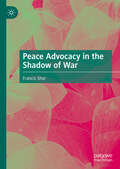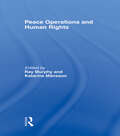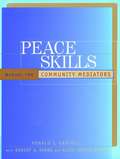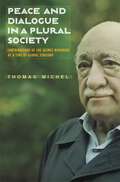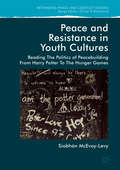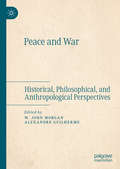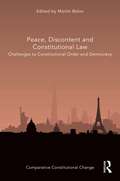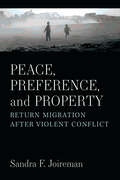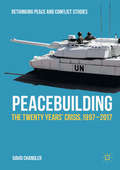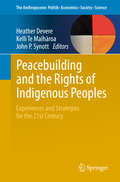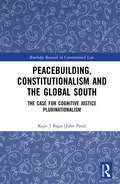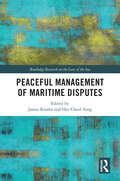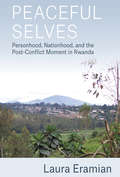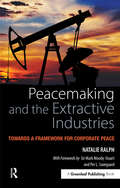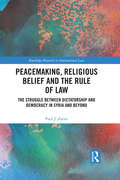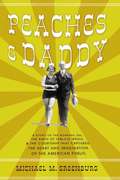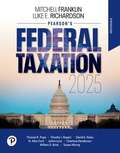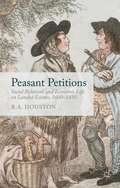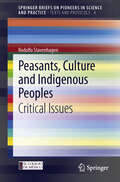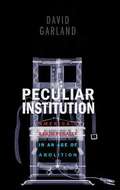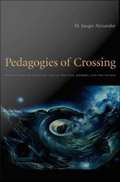- Table View
- List View
Peace Advocacy in the Shadow of War
by Francis ShorFor peace advocates a corollary to Clausewitz’s dictum that “war is politics by other means” might be that other politics could prevent war. By highlighting both individual peace advocates and antiwar/peace organizations from World War I through the wars of the 21st century, the chapters will provide insights into how these individuals and organizations articulated their opposition to and mobilized against specific wars and international/regional conflicts. Organized roughly in chronological order, each chapter will illuminate the socio-historical conditions under which such peace advocacy contested state aggression and armed combat at the national and/or transnational levels. Beyond understanding the specific socio-historical circumstances within which these antiwar and peace advocates and organizations operated and their resultant achievements and failures, the book as a whole will examine the kind of politics that perpetuate war and those that offer a challenge to that perpetuation. Scholars, students, and the general public interested in the history of modern and contemporary wars, peace and conflict studies, and ethical/political perspectives in the 20th and 21st centuries should find much to reflect upon in this book.
Peace Officer's Guide to Criminal Law
by George T. Payton James E. GuffeyPeace Officer's Guide to Criminal Law Twenty-Fifth Edition by George T. Payton and James E. Guffey.
Peace Operations and Human Rights
by Ray Murphy and Katarina MånssonThe protection and promotion of human rights is an integral part of contemporary international peacekeeping operations. It is also a controversial aspect of peace operations at both an institutional and operational level. By bringing together a wide range of practitioners and academic scholars, this special issue addresses key contemporary legal, political and operational challenges to human rights protection. This book was previously published as a special issue of the leading journal International Peacekeeping.
Peace Skills: Manual for Community Mediators
by Ronald Kraybill Alice Evans Robert EvansHow to be a "peacebuilder" and mediate between conflicted entities.
Peace and Dialogue in a Plural Society: Contributions of the Hizmet Movement at a time of Global Tensions
by Thomas MichelIn a world that is too often seen as a cloash of civilizations, some believe there is another way, a path that involves engagement, dialogue, and respect. In Thomas Michel's new book, Peace and Dialogue in a Plural Society, he explores how Fethullah Gulen is one of those speaking most vocally in favor of a world community, where different faiths and nations can come together at one table to solve the multitude of problems facing today's world. Exploring the spiritual roots of Gulen and the Hizmet Movement, as well as drawing parallels between his own work as a Catholic priest, Michel shows how Hizmet has helped build a blueprint for intercultural communication in a time when too many voices are trying to stoke the fires of discord. Through education, dialogue, and a respect for basic human dignity, Michel finds a foundation in Gulen's faith and Hizmet's service upon which a healthy, diverse society can be built.
Peace and Resistance in Youth Cultures
by Siobhan McEvoy-LevyThis book offers a rationale for and ways of reading popular culture for peace. It argues that we can improve peacebuilding theory and practice through examining popular culture's youth revolutionaries and their outcomes - from their digital and plastic renderings to their living embodiments in local struggles for justice. The study combines insights from post-structural, post-colonial, feminist, youth studies and peace and conflict studies theories to analyze the literary themes, political uses, and cultural impacts of two hit book series - Harry Potter and The Hunger Games - tracing how these works have been transformed into visible political practices, including social justice advocacy and government propaganda in the War on Terror. Pop culture production and consumption help maintain global hierarchies of inequality and structural violence but can also connect people across divisions through fandom participation. Including chapters on fan activism, fan fiction, Guantanamo Bay detention center, youth as a discursive construct in IR, and the merchandizing and tourism opportunities connected with The Hunger Games, the book argues that through taking youth-oriented pop culture seriously, we can better understand the local, global and transnational spaces, discourses, and the relations of power, within which meanings and practices of peace are known, negotiated, encoded and obstructed.
Peace and War: Historical, Philosophical, and Anthropological Perspectives
by Alexandre Guilherme W. John MorganPeace and War: Historical, Philosophical, and Anthropological Perspectives is an accessible, higher-level critical discussion of philosophical commentaries on the nature of peace and war. It introduces and analyses various philosophies of peace and war, and their continuing theoretical and practical relevance for peace studies and conflict resolution. Using a combination of both historical and contemporary philosophical perspectives, the book is at once eclectic in its approach and broad in its inquiry of these enduring phenomena of human existence.
Peace at What Price?
by Sarah E. CrocoWhy do some leaders stay in wars they are unlikely to win? Why do other leaders give in to their adversaries' demands when continued fighting is still possible? Peace at What Price? strives to answer these questions by offering a new theoretical concept: leader culpability. Culpable leaders - those who can be credibly linked to the decision to involve the state in the war - face a significantly higher likelihood of domestic punishment if they fail to win a war than non-culpable leaders who do the same. Consequently, culpable leaders will prosecute wars very differently from their non-culpable counterparts. Utilizing a large-N analysis and case illustrations, the book's findings challenge the conventional wisdom regarding the relationship between war outcomes and leader removal and demonstrate the necessity of looking at individual leader attributes, instead of collapsing leaders by regime type. The book also offers new insights on democracies at war and speaks to the American experience in the wars in Iraq and Afghanistan.
Peace, Discontent and Constitutional Law: Challenges to Constitutional Order and Democracy (Comparative Constitutional Change)
by Martin BelovThis book offers a multi-discursive analysis of the constitutional foundations for peaceful coexistence, the constitutional background for discontent and the impact of discontent, and the consequences of conflict and revolution on the constitutional order of a democratic society which may lead to its implosion. It explores the capacity of the constitutional order to serve as a reliable framework for peaceful co-existence while allowing for reasonable and legitimate discontent. It outlines the main factors contributing to rising pressure on constitutional order which may produce an implosion of constitutionalism and constitutional democracy as we have come to know it. The collection presents a wide range of views on the ongoing implosion of the liberal-democratic constitutional consensus which predetermined the constitutional axiology, the institutional design, the constitutional mythology and the functioning of the constitutional orders since the last decades of the 20th century. The constitutional perspective is supplemented with perspectives from financial, EU, labour and social security law, administrative law, migration and religious law. Liberal viewpoints encounter radical democratic and critical legal viewpoints. The work thus allows for a plurality of viewpoints, theoretical preferences and thematic discourses offering a pluralist scientific account of the key challenges to peaceful coexistence within the current constitutional framework. The book provides a valuable resource for academics, researchers and policymakers working in the areas of constitutional law and politics.
Peace, Preference, and Property: Return Migration after Violent Conflict
by Sandra F JoiremanGrowing numbers of people are displaced by war and violent conflict. In Ukraine, Afghanistan, Ethiopia, Myanmar, Syria, and elsewhere violence pushes civilian populations from their homes and sometimes from their countries, making them refugees. In previous decades, millions of refugees and displaced people returned to their place of origin after conflict or were resettled in countries in the Global North. Now displacements last longer, the number of people returning home is lower, and opportunities for resettlement are shrinking. More and more people spend decades in refugee camps or displaced within their own countries, raising their children away from their home communities and cultures. In this context, international policies encourage return to place of origin. Using case studies and first-person accounts from interviews and fieldwork in post-conflict settings such as Uganda, Liberia, and Kosovo, Sandra F. Joireman highlights the divergence between these policies and the preferences of conflict-displaced people. Rather than looking from the top down, at the rights that people have in international and domestic law, the perspective of this text is from the ground up—examining individual and household choices after conflict. Some refugees want to go home, some do not want to return, some want to return to their countries of origin but live in a different place, and others are repatriated against their will when they have no other options. Peace, Preference, and Property suggests alternative policies that would provide greater choice for displaced people in terms of property restitution and solutions to displacement.
Peacebuilding
by David ChandlerMoving beyond the binary argument between those who buy into the aims of creating liberal democratic states grounded in free markets and rule of law, and those who critique and oppose them, this timely and much-needed critical volume takes a fresh look at the liberal peace debate. In doing so, it examines the validity of this critique in contemporary peacebuilding and statebuilding practice through a multitude of case studies - from Afghanistan to Somalia, Sri Lanka to Kosovo. Going further, it investigates the underlying theoretical assumptions of liberal peacebuilding and statebuilding, as well as providing new theoretical propositions for understanding current interventions. Written by some of the most prominent scholars in the field, alongside several new scholars making cutting edge contributions, this is an essential contribution to a rapidly growing interdisciplinary area of study.
Peacebuilding and the Rights of Indigenous Peoples
by Heather Devere Kelli Te Maihāroa John P. SynottThis book analyses efforts to advance the rights of Indigenous People within peace-building frameworks: Section I critically explores key issues concerning Indigenous Peoples' Rights (struggles for land, human, cultural, civil, legal and constitutional rights) in connection with key approaches in peace-building (such as nonviolence, non-violent strategic action, peace education, sustainability, gender equality, cultures of peace, and environmental protection). Section II examines indigenous leaders and movements using peace and non-violent strategies, while Section III presents case studies on the successes and failures of peace perspectives regarding contributions to/ developments in/ advancement of/ barriers to the rights of Indigenous Peoples. Lastly, Section IV investigates what advances have been achieved in Universal Indigenous Peoples' Rights in the 21st century within the context of sustainable peace.
Peacebuilding, Constitutionalism and the Global South: The Case for Cognitive Justice Plurinationalism (Routledge Research in Constitutional Law)
by Kajit J Bagu (John Paul)This book presents the case that liberal constitutionalism in the global South is a legacy of colonialism and is inappropriate as a means of securing effective peace in regions that have been subject to recurrent conflict. The work demonstrates the failure of liberal constitutionalism in guaranteeing peace in the postcolonial global South. It develops an alternative, more compelling constitutionalism for peacebuilding in conflicted regions. This is based on constitutionalism that recognises plurality as a major feature in the global South. Drawing on events in Nigeria, it develops a constitutional model, based on Cognitive Justice, which could deliver peace by addressing historic, conceptual, legal, institutional and structural issues that have created social inequality and injustice. The study also incorporates insights from the development of plurinational constitutions in South America. The book will be an invaluable resource for researchers, academics and policy-makers with an interest in constitutional legal theory, peacebuilding and postcolonial studies
Peaceful Management of Maritime Disputes (Routledge Research on the Law of the Sea)
by James Kraska and Hee Cheol YangInternational law concerning maritime boundary dispute resolution reflects normative aspirations for peacefully managing some of the most intractable challenges in foreign affairs. Focusing on key international law issues relating to maritime boundary disputes, this book explores how international law and legal institutions facilitate these goals theoretically and practically. This process includes a balance of equities among states grounded in the Charter of the United Nations and the protection of sovereignty, territorial integrity, and political independence of Member States, while avoiding threats to the peace, breaches of the peace, and acts of aggression. The UN Charter is complemented by the rules in customary law and UNCLOS for evaluating maritime claims and addressing disputes, including conciliation, litigation, and arbitration. Despite the comprehensive nature of these procedures, numerous maritime disputes persist, including those in the East China Sea and South China Sea. As the disputes continue, however, general international law and the UNCLOS framework captures additional norms and rules that may act to reduce tension and manage disputes. As States shift closer to or farther from compliance on maritime claims and delimitation, the rules of behavior that pertain to flag States and coastal States may help to maintain the peace. This volume offers a distributed study in the factors affecting maritime disputes, international law frameworks and diplomatic models for addressing them, and legal, security, and historical dynamics in East Asia. The book goes beyond the existing debate to offer suitable methods for managing contemporary disputes and makes a meaningful impact on thinking about regional maritime security and international maritime law.
Peaceful Selves: Personhood, Nationhood, and the Post-Conflict Moment in Rwanda
by Laura EramianThis ethnography of personhood in post-genocide Rwanda investigates how residents of a small town grapple with what kinds of persons they ought to become in the wake of violence. Based on fieldwork carried out over the course of a decade, it uncovers how conflicting moral demands emerge from the 1994 genocide, from cultural contradictions around "good" personhood, and from both state and popular visions for the future. What emerges is a profound dissonance in town residents' selfhood. While they strive to be agents of change who can catalyze a new era of modern Rwandan nationhood, they are also devastated by the genocide and struggle to recover a sense of selfhood and belonging in the absence of kin, friends, and neighbors. In drawing out the contradictions at the heart of self-making and social life in contemporary Rwanda, this book asserts a novel argument about the ordinary lives caught in global post-conflict imperatives to remember and to forget, to mourn and to prosper.
Peacemaking and the Extractive Industries: Towards a Framework for Corporate Peace
by Natalie RalphPeacemaking and the Extractive Industries addresses a significant gap in research on the political and diplomatic role of multinational corporations in peace processes in intrastate conflict: Corporate Peacemaking. The author focuses on corporations in the oil and mining sectors, supporting or participating in peace negotiations and mediation. The chapters explore national-level peace processes, as well as those at community and global levels. While the focus is on extractive companies, the findings are valuable to companies from all industries looking at peace-related processes. This ground-breaking book gives a comprehensive picture of how Corporate Peacemaking currently works, how it can be developed and implemented, and how it is likely to impact global governance and corporate culture in the future. The book demonstrates that Corporate Peacemaking has the potential to be a powerful element in international governance and peace efforts; and Ralph shows through the business case that companies, as well as communities, will benefit. Ralph presents a new framework for Corporate Peace that will assist companies from all sectors in countries experiencing violent conflict, in addition to instability, human rights abuses and poor governance. Based on rigorous academic research with practical case studies, it is essential reading for practitioners, academics, policy-makers and NGOs.
Peacemaking, Religious Belief and the Rule of Law: The Struggle between Dictatorship and Democracy in Syria and Beyond (Routledge Research in International Law)
by Paul J. ZwierThis book offers a new way of understanding the role of the mediator in teaching parties the interrelationship between sustainable peace, forgiveness, and international justice. It argues that the arrival of social media presents new opportunities for reaching sustainable peace agreements, through their use in gathering the detailed information that can match victims and perpetrators of past atrocities. The author aims to advance a more expansive understanding of the subjects and limitations of making peace in the shadow of international law by examining the concepts of mediation and forgiveness that exist alongside law. To that end, the book offers an account of the role of the mediator that emerges from the interplay between Ricouerian imagination and forgiveness and predicts ever-greater opportunities for making peace and protecting human rights that can be facilitated by a harnessing of social media as a tool for making peace with justice. The author also aims to examine how strategies for sustaining the peace must combat the inevitable frustrations with democracy that can lead to a slide into dictatorship. Assad, Obama, and the UN leadership and their decisions concerning making and maintaining peace in Syria are used as case studies to examine the interplay between a leaders’ religious beliefs, faith in democracy and rule of law, and impulses towards totalitarianism.
Peaches and Daddy: A Story of the Roaring Twenties, the Birth of Tabloid Media, and the Courtship That Captured the Heart and Imagination of the American Public
by Michael M. Greenburg"Peaches & Daddy" vividly recounts the amazing and improbable 1926 marriage and legal battle between a 51-year-old Manhattan millionaire and a 15-year-old girl. Their story captured the imagination of the American public and gave birth to tabloid journalism.
Pearson Drive Right (11th Edition): Skills and Application Workbook
by Elizabeth A. WeaverPearson Drive Right (11th Edition) Skills and Application Workbook by Elizabeth A. Weaver.
Pearson's Federal Taxation 2025 Individuals
by Mitchell Franklin Luke E. RichardsonPearson’s Federal Taxation 2025 Individuals, of the hallmark Franklin and Richardson series, clearly explains the principles of taxation and the latest tax regulations. It covers all entities, with often briefer treatment than the Corporations and Comprehensive volumes. This long-trusted resource blends technical aspects of tax law with maximum readability and relevance. Hands-on practice problems will help you apply tax principles to practical accounting practices. The 38th Edition incorporates tax information from 2023 and early 2024. The new edition is a complete refresh reflecting the latest tax rulings and regulations, as well as their implications for tax law. It features an abundance of new real-world examples and significant court cases demonstrating the current tax law at work.
Peasant Petitions
by R. A. HoustonThis book examines the structures and texture of rural social relationships, using one type of document found in abundance over all the four component parts of Britain and Ireland: petitions from tenants to their landlords. The book offers unexpected angles on many aspects of society and economy on estates in the 17th and 18th centuries.
Peasants, Culture and Indigenous Peoples
by Rodolfo StavenhagenThis last volume in a trilogy published on the occasion of the 80th birthday of Rodolfo Stavenhagen, professor emeritus of El Colegio de Mexico, includes eight essays on Peasants, Culture and Indigenous Peoples: Critical Issues; Basic Needs, Peasants and the Strategy for Rural Development (1976); Cultural Rights: a Social Science Perspective (1998); The Structure of Injustice: Poverty, Marginality, Exclusion and Human Rights (2000); What Kind of Yarn? From Color Line to Multicolored Hammock: Reflections on Racism and Public Policy (2001); The United Nations Special Rapporteur on the Rights of Indigenous Peoples (2012); A Report on the Human Rights Situation of Indigenous Peoples in Asia (2007); Report on the Impact of Megaprojects on the Rights of Indigenous Peoples (2003); and Study Regarding the Best Practices to Implement the Recommendations of the Special Rapporteur (2007). These texts address human rights issues, especially those that arose when Stavenhagen was servinged as United Nations special rapporteur on the rights of indigenous peoples.
Peculiar Institution: America's Death Penalty In An Age Of Abolition
by David GarlandThe U.S. death penalty is a peculiar institution, and a uniquely American one. Despite its comprehensive abolition elsewhere in the Western world, capital punishment continues in dozens of American states– a fact that is frequently discussed but rarely understood. The same puzzlement surrounds the peculiar form that American capital punishment now takes, with its uneven application, its seemingly endless delays, and the uncertainty of its ever being carried out in individual cases, none of which seem conducive to effective crime control or criminal justice. In a brilliantly provocative study, David Garland explains this tenacity and shows how death penalty practice has come to bear the distinctive hallmarks of America’s political institutions and cultural conflicts. <p><p> America’s radical federalism and local democracy, as well as its legacy of violence and racism, account for our divergence from the rest of the West. Whereas the elites of other nations were able to impose nationwide abolition from above despite public objections, American elites are unable– and unwilling– to end a punishment that has the support of local majorities and a storied place in popular culture. <p> In the course of hundreds of decisions, federal courts sought to rationalize and civilize an institution that too often resembled a lynching, producing layers of legal process but also delays and reversals. Yet the Supreme Court insists that the issue is to be decided by local political actors and public opinion. So the death penalty continues to respond to popular will, enhancing the power of criminal justice professionals, providing drama for the media, and bringing pleasure to a public audience who consumes its chilling tales. <p> Garland brings a new clarity to our understanding of this peculiar institution– and a new challenge to supporters and opponents alike.
Pedagogies of Crossing: Meditations on Feminism, Sexual Politics, Memory, and the Sacred
by M. Jacqui AlexanderM. Jacqui Alexander is one of the most important theorists of transnational feminism working today. Pedagogies of Crossing brings together essays she has written over the past decade, uniting her incisive critiques, which have had such a profound impact on feminist, queer, and critical race theories, with some of her more recent work. In this landmark interdisciplinary volume, Alexander points to a number of critical imperatives made all the more urgent by contemporary manifestations of neoimperialism and neocolonialism. Among these are the need for North American feminism and queer studies to take up transnational frameworks that foreground questions of colonialism, political economy, and racial formation; for a thorough re-conceptualization of modernity to account for the heteronormative regulatory practices of modern state formations; and for feminists to wrestle with the spiritual dimensions of experience and the meaning of sacred subjectivity. In these meditations, Alexander deftly unites large, often contradictory, historical processes across time and space. She focuses on the criminalization of queer communities in both the United States and the Caribbean in ways that prompt us to rethink how modernity invents its own traditions; she juxtaposes the political organizing and consciousness of women workers in global factories in Mexico, the Caribbean, and Canada with the pressing need for those in the academic factory to teach for social justice; she reflects on the limits and failures of liberal pluralism; and she presents original and compelling arguments that show how and why transgenerational memory is an indispensable spiritual practice within differently constituted women-of-color communities as it operates as a powerful antidote to oppression. In this multifaceted, visionary book, Alexander maps the terrain of alternative histories and offers new forms of knowledge with which to mold alternative futures.
Pediatric Bioethics
by Geoffrey MillerThis volume offers a theoretical and practical overview of the ethics of pediatric medicine. It serves as a fundamental handbook and resource for pediatricians, nurses, residents in training, graduate students, and practitioners of ethics and healthcare policy. Written by a team of leading experts, Pediatric Bioethics addresses those difficult ethical questions concerning the clinical and academic practice of pediatrics, including an approach to recognizing boundaries when confronted with issues such as end of life care, life-sustaining treatment, extreme prematurity, pharmacotherapy, and research. Thorny topics such as what constitutes best interests, personhood, or distributive justice and public health concerns such as immunization and newborn genetic screening are also addressed.
